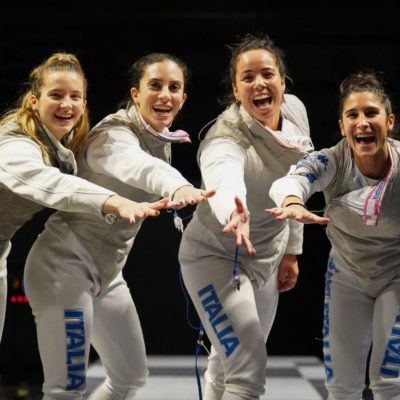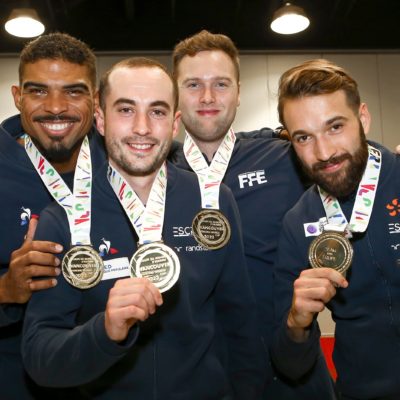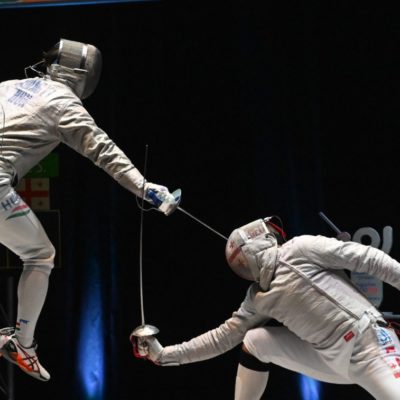From January/February 1987 – Volume 38, Number 3
Csaba Elthes is indeed one of the greatest sabre coaches this country has known. He escaped from Hungary via Yugoslavia in 1957, bringing nothing but an indomitable spirit and his knowledge of fencing. He began to coach at St. Peter’s College in New Jersey, and did part-time coaching at Giorgio Santelli’s salle. His talents were soon recognized and by 1960 he became the U.S. Olympic sabre coach.
Csaba Elthes – Coach of Champions
Transcribed from tape by Albert Axelrod
Csaba’s influence on sabre fencing was felt soon after he came to this country. His students rapidly dominated sabre competitions, as the following tabulation shows so dramatically:
Year Prior Tableau Finalists 1970 7 of 8 1971 6 of 12 5 of 8 1972 8 of 12 All finalists 1973 9 of 12 All finalists 1974 8 of 12 5 of 6 1975 10 of 12 All finalists 1976 8 of 12 5 of 6 1977 9 of 12 All finalists 1978 10 of 12 5 of 6 1979 10 of 12 All finalists 1980 20 of 32 5 of 6 1981 14 of 16 All finalists 1982 15 of 16 All finalists 1983 13 of 16 All finalists 1984 14 of 16 7 of 8 1985 13 of 16 All(#1 thru #13) 1986 13 of 16 7 of 8
Csaba’s teams have won the team championships 22 times in 25 years, the last 14 being successive wins. Impressive as the list is, it does not reflect the fact that his pupils have demonstrated formidable international competence as well. Our sabre team took fourth place in the 1960 Olympics. Other pupils, notably Dasaro, Morales, Orban, Blum, Apostol and Losenczy have been finalists in various world and Olympic championships. And most recently, the ultimate reward from Westbrook–an Olympic medal. His coaching style is unique and has evoked praise from the great masters of Europe. Rudolf Karpati calls him "one of the last great sabre masters left in the world today"
Maestro Elthes’ achievements are not limited to sabre-his NYAC Epee team won many national team championships and some of its members have won the national title. In foil, two of his women pupils have won the national championships. The writer himself, with skills maintained by Csaba, won the national title in 1970 and remained a ranking fencer until retirement.
Csaba has brought honor to American fencing. It is only fitting that Maestro Elthes be in turn honored and given the laurels so truly deserved while he can savor and enjoy their fragrance.
Elthes was born in 1912, became a Doctor of Law in 1936, continued with advanced studies, acquired the highest academic degree achievable in Hungary, and was assigned an important post in the Hungarian Ministry of the Interior. Russian occupation and their distrust of people of prior regimes pushed Elthes to rely on what was his hobby for survival and eventual escape to the United States. From this point on, Elthes speaks.
"Until I was eight years old, I lived in the city of my birth in the northernmost part Old Hungary, Transylvania, on the Romanian frontier. My father was an attorney and my grandfather was a judge of highest level. When the Versailles treaty was signed and Transylvania given to the Romanians, my family moved to Budapest.
It was here that I went to gymnasium, where I studied literature, mathematics, sciences, history, Latin and other languages. When I was 13 years old my father said that I had to study fencing. Mot because he thought I would be a champion-but because he knew that I would need it. My father understood that when I graduated, I would be a reserve officer, and because of my education as a lawyer I would find myself in an influential and upper class environment, where, whether I wanted to or not, I could become involved in a duel and have to defend myself.
Dueling was part of the way of life in Europe in those days. Even though it was illegal, at nine o’clock, after the regular fencing hours, duels to resolve affairs of honor were held. One frequently couldn’t anticipate what provoked many of the duels,–they could have been political, caused by comments made in parliament or at a party, cherchez-la-femme, but in many cases it was possible to become involved against your will. If a challenge was issued, cards were exchanged, the seconds met to fix the time and a duel was held. Duels were taken seriously. The challenged one had to fight lest he lose the respect of his peers. The best way to avoid being challenged was to have the reputation of being an expert duelist.
Of course one could not be killed in a typical duel-the weapons were sharp and could cut the flesh easily, but were too light to have penetrating power. The wrists and the neck were bandaged, but the face, back and chest could be cut with the very sharp blades. If someone felt that the insult was extremely serious he could insist that the bandages be omitted. In extremely serious affairs, the thrust was permitted-and in these duels deaths were possible.
I had no love for dueling, but knowing how to fence well was important to be able to move comfortably in this social structure. Acceptance of the duel had another effect–it made people polite and think twice before they spoke ill of another person.
Fencing was not my only sport–at school I was the water polo captain, on the track and field team, threw the javelin and the discus, was active in rowing, skiing, and Ping-Pong. In 1933, when I turned 18, I went to the university in Budapest to study law. This is when I decided that fencing was the sport I really preferred. The university had one of Hungary’s three greatest coaches, Dr. Laszlo Gerentser. I was fortunate that the other two were also available to me and to help me to learn still more about fencing sabre. These also great coaches were Italo Santelli, Giorgio’s father, who had his private salle and Laszlo Borsodi who coached at the Hungarian Officer’s Club and the Hungarian Fencing Academy. In one year I made the university team. In 1936 I became a #1 fencer, and in 1938 I was competing on national university teams and fenced internationally with excellent results.
War broke out in 1941, and I served as a Lieutenant in the Third Hussar Cavalry Regiment on the Russian front. My unit was recalled in six months, and because of my law degrees, I was assigned to the Ministry of the Interior where I reported directly to the Minister of the Interior. When the war. was over, the victorious Russians methodically changed all the people in the ministry. Eventually, my post in the ministry was eliminated. It was the worst part of the Stalin era.
Events began to occur that were to make fencing very important in my life and my struggle for survival. The Russians had planned to abolish fencing because it was felt to be a bourgeois sport. but when they realized that there are twenty-four medals in the Olympics, they decided to study fencing and use the Hungarians to teach and train them. Bela Bay was made the first leader of the Hungarian fencing organization. and under him Pilar began to coach fencing and to fill the void created by the passing of so many of the great coaches of Hungary. It was at this time that the greatness of Hungarian fencing was reborn. In 1951, George Pilar asked if I would like to become a fencing coach. I had started to teach fencing in 1951 at one of the many clubs in Budapest. In two years my pupils began to achieve national rankings. I earned my coach’s diploma in 1953 and received my expert diploma in 1956. In 1956, I was told by Pilar and Gerevich and Dr. Boros to prepare myself because they were going to take me to Tata, the training camp for the olympic team, where I would be a partner and one of the coaches of the Olympic team. But it was not to be. At the last moment, I was informed that I was not to go-and it was Bela Bay, who had replaced me with another coach at the last minute. I knew I was not persona grata with the communists, but there was little I could do.
The situation was becoming hopeless. It had become very clear; that for whatever the reason, I was not in favor with the regime that was controlling fencing and affecting my life. Then came the Hungarian revolution with its tragic ending and worsening conditions. I knew that I must leave the country.
In 1957, I escaped from Hungary into Yugoslavia, where I was placed in an internment camp. I managed to survive for eight months, until the Americans came and brought many of the camp prisoners, including me, to the United States.
The next thing I knew was that on the 7th of October, 1967, I was in the United States, registered in New York’s St. George Hotel, and on the second day they told me good-bye and I was free to go! Where could I go? I was afraid to go into the street. Fortunately, other Hungarians in this country found me, and began to find work for me. I started my first job in St. Peter’s college. I had to find my way from Brooklyn to New Jersey with no knowledge of English. I found another job in a factory that made ash-trays. The pay was very little, but I could pay the rent, buy food, and still save for a pair of shoes from my weekly earnings. I felt like a Croesus, because in Hungary you had to sell a family heirloom to get enough for a pair of shoes.
Little by little I began to get more pupils. Giorgio Santelli let me help with sabre lessons at his club. This was very good for me-I worked with Pallaghy, Worth, Bob Blum, Kwartler and the team won the nationals. It was a great moment for them. They had to beat a team made up of the great Pilar’s pupils-Magay (a member of Hungary’s gold medallist team), Orley, and Domolky and-all of whom defected and came here This was not because of me, you understand, they were Giorgio’s pupils-but I helped train them and they liked my lessons. After this, I began to teach at the Fencers Club and shortly after I started at the New York Athletic Club. At last I felt established and comfortable in my new homeland.
Everything I have spoken of had to do with how I grew up, lived and worked. Through all these I had the normal things that people have when living in a society where there were friends and acquaintances-romance, courtship, marriage and children. I married in 1945. My first wife, Ingeborg Gundisch, was the 1943 foil champion of Hungary. We had two girls. Adrian, the first, was born in 1947 and Esther was born in 1950. Adrian is an architect, is married, lives in Austria and has two children,-my grandchildren. Esther is a dentist in West Germany, and also married. Ingeborg and I divorced in 1954, and the two girls naturally went with their mother. I visit Hungary every summer and see my children and grandchildren. There are no hard feelings-I am their father and we understand how things can change between people. I have since remarried. I knew Baba, my present wife, from Hungary. We met again in the United States and it is here that we got married.
You know, I go to Europe once, twice a year, and always visit Hungary. For a long time I dreamed of going back to Budapest when I retired. Then I began to see how the regime makes the people change, in the way they think, the way they are so careful about what they say and who they say it to. I began to appreciate and understand the meaning of America and freedom.
I still enjoy visiting my old homeland and seeing my children and my old friends, but I tell you, after two weeks I have had enough and I can’t wait to get back to the United States. I also thought once to live in Paris, but for me, there is no place but New York where I want to live.
In my teaching career I never considered who was talented and who was not because it was my principle always that in the fencing sport nobody is lost, nobody is hopeless. Everyone can. be a good fencer if he has a good coach has a love about fencing is diligent and tries hard and practices. Fencing is n technical sport and it is not true that just selected outstanding talent can be a good fencer. This was my principal-and with this belief always tried to push and work hard to make a good fencer of everybody, who came to me." And, with a justifiable sense of pride and accomplishment, meditatively added-"Naturally this was not always an easy thing but if I would say names of people who, with only modest talent, made our Olympic team and had good results in international competition, I could prove my point."
His credo, captured in the those words, summarizes his dedication to his students, and is reminiscent of some of the great fencing masters so recently lost to fencing. Csaba. American Fencing salutes you. We owe you much — be assured that what you have done is appreciated.
AMERICAN FENCING magazine (ISSN 0002-8436) is an official publication of the USFA, Inc. and is published quarterly. Opinions expressed in archived articles do not necessarily reflect the views of this site, AMERICAN FENCING, or the USFA.
Copyright 1995, USFA





